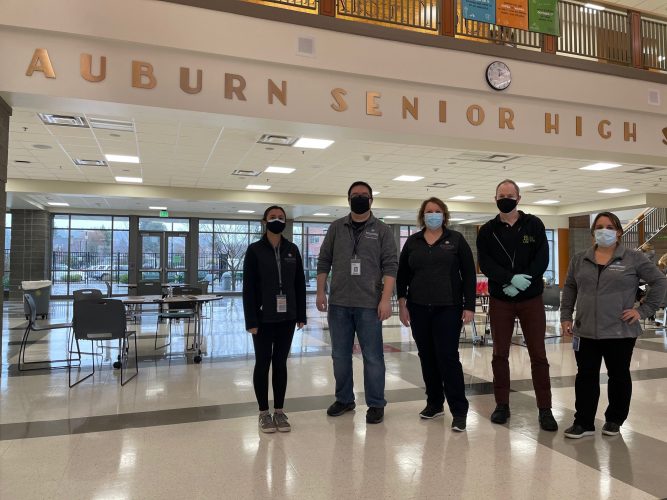
A year ago, many schools shuttered due to COVID-19, forcing schools and families to transition into unknown territory: remote learning. Today, thanks to a partnership between Seattle Children’s and school districts in Washington, schools are one step closer to transitioning back to in-person learning.
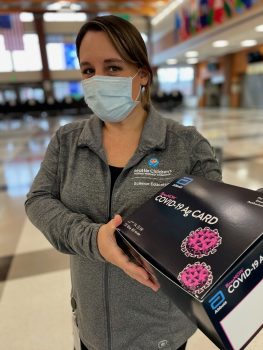 Seattle Children’s and educational leaders recently launched the Washington State School-Based COVID-19 Rapid Testing Program. The program, which started with Auburn School District, will eventually expand to more districts across the state.
Seattle Children’s and educational leaders recently launched the Washington State School-Based COVID-19 Rapid Testing Program. The program, which started with Auburn School District, will eventually expand to more districts across the state.
The pilot program is currently working with 10 school districts across the western Puget Sound region. Each district has the opportunity to create weekly a COVID-19 testing program tailored for its own schools, staff and students.
“The collaboration between the school districts and the local, state and federal government has been truly remarkable. It’s taken the concerted effort of people across organizations to launch this program,” said Dr. Eric Tham, interim senior vice president of Seattle Children’s Research Institute. “I’m incredibly proud of our teams at Seattle Children’s who have worked tirelessly to support this important work and have gone above and beyond to help get kids back to school safely.”
The partnership first started to take form when Rep. Kim Schrier learned in December of an HHS rapid testing pilot for children to help students return to in-person learning. She was interested in opening this pilot to students in Washington state and contacted Dr. Jeff Sperring, CEO of Seattle Children’s and fellow pediatrician, to see if Seattle Children’s would be a pilot site. Sperring agreed to put a team together and HHS has provided 300,000 rapid tests to support the pilot.
Building a program from the ground up
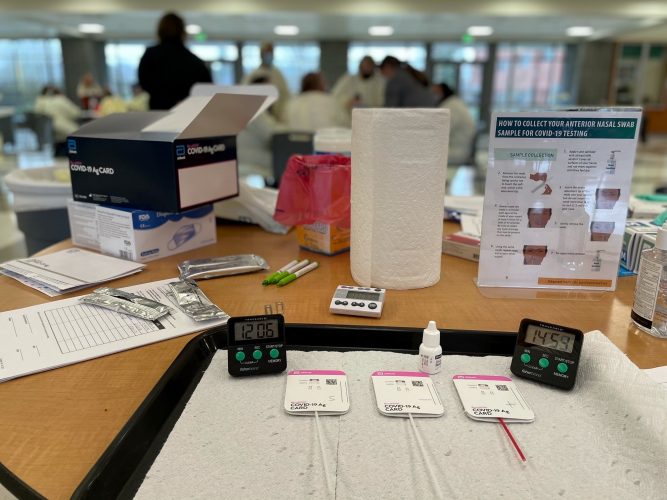
Auburn High School was bustling with school nurses and health technicians weeks ago as a training program with Seattle Children’s Science Education team ramped up. In one day, the training, led by Dr. Amanda Jones, senior director of education initiatives at Seattle Children’s Research Institute, helped train more than 40 school personnel to use point-of-care rapid antigen test cards technology. The rapid tests only take about 15 minutes and results are clearly indicated with either a single red line for a negative result or a double red line for a positive result.
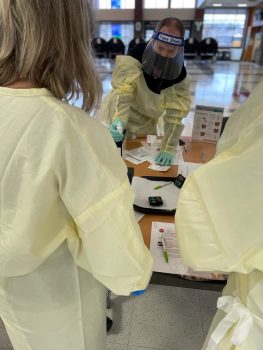 Seattle Children’s will perform rapid COVID-19 testing for asymptomatic staff and students with the support of school district personnel who are trained and monitored by Seattle Children’s. Seattle Children’s is providing implementation support to create sustainable programming within schools across Western Washington. Seattle Children’s has also arranged for an online data reporting solution, the WA Rapid Test Web-App with support provided by Southwest Texas Regional Advisory Council (STRAC), to be available for the school-based testing sites.
Seattle Children’s will perform rapid COVID-19 testing for asymptomatic staff and students with the support of school district personnel who are trained and monitored by Seattle Children’s. Seattle Children’s is providing implementation support to create sustainable programming within schools across Western Washington. Seattle Children’s has also arranged for an online data reporting solution, the WA Rapid Test Web-App with support provided by Southwest Texas Regional Advisory Council (STRAC), to be available for the school-based testing sites.
Participants register for testing and create an encrypted QR code using a web-based registration site. Test operators scan the participant’s QR code and a QR code on the rapid tests. Test results are entered into the app, which automatically reports the results to the participant and the state Department of Health. If an individual is positive, they are referred to their primary care provider for follow up and the results are flagged for public health officials who can initiate contact tracing.
The program aims to help get staff and students back to school safely and bolster confidence in in-person learning. The program is modeled after similar public health initiatives launched in Texas and Pennsylvania.
Getting back to normal
When school closed last year, so did Jones’ science education programs, and Seattle Children’s Science Adventure Lab transitioned to a virtual program. Instead of their normal road show style education programs, they created online modules students could take online.
“We haven’t been able to see kids in-person since March 2020,” Jones said. “This program is helping school personnel feel safe, and we’re a step closer to helping get kids back to school.”
Jones said she’s excited to get back to in-person learning, and she is grateful for the opportunity to help launch the program.
A collaboration across organizations
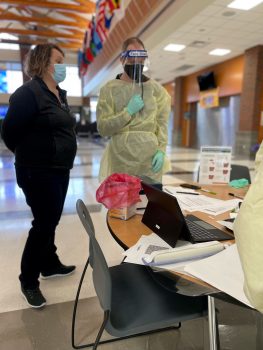 Getting this program running in Washington state has truly been a collaboration across organizations, and Schrier was instrumental.
Getting this program running in Washington state has truly been a collaboration across organizations, and Schrier was instrumental.
“I am thrilled that we have been able to get this partnership off the ground and make our schools even safer for students and staff,” said Schrier.
At Seattle Children’s, many teams worked behind the scenes to provide support and direction for the program.
Dr. Danielle Zerr, a co-leader of the partnership and chief of pediatric infectious diseases and medical director for infection prevention at Seattle Children’s, said she’s been impressed with the amount of teamwork it has taken across the organization to get the program launched.
“This program has truly been a collaboration, and we are grateful for the partnership,” said Zerr. “Together, we have created something to fill a gap for a number of school districts. This program will serve as another tool to support safe in-person learning.”

